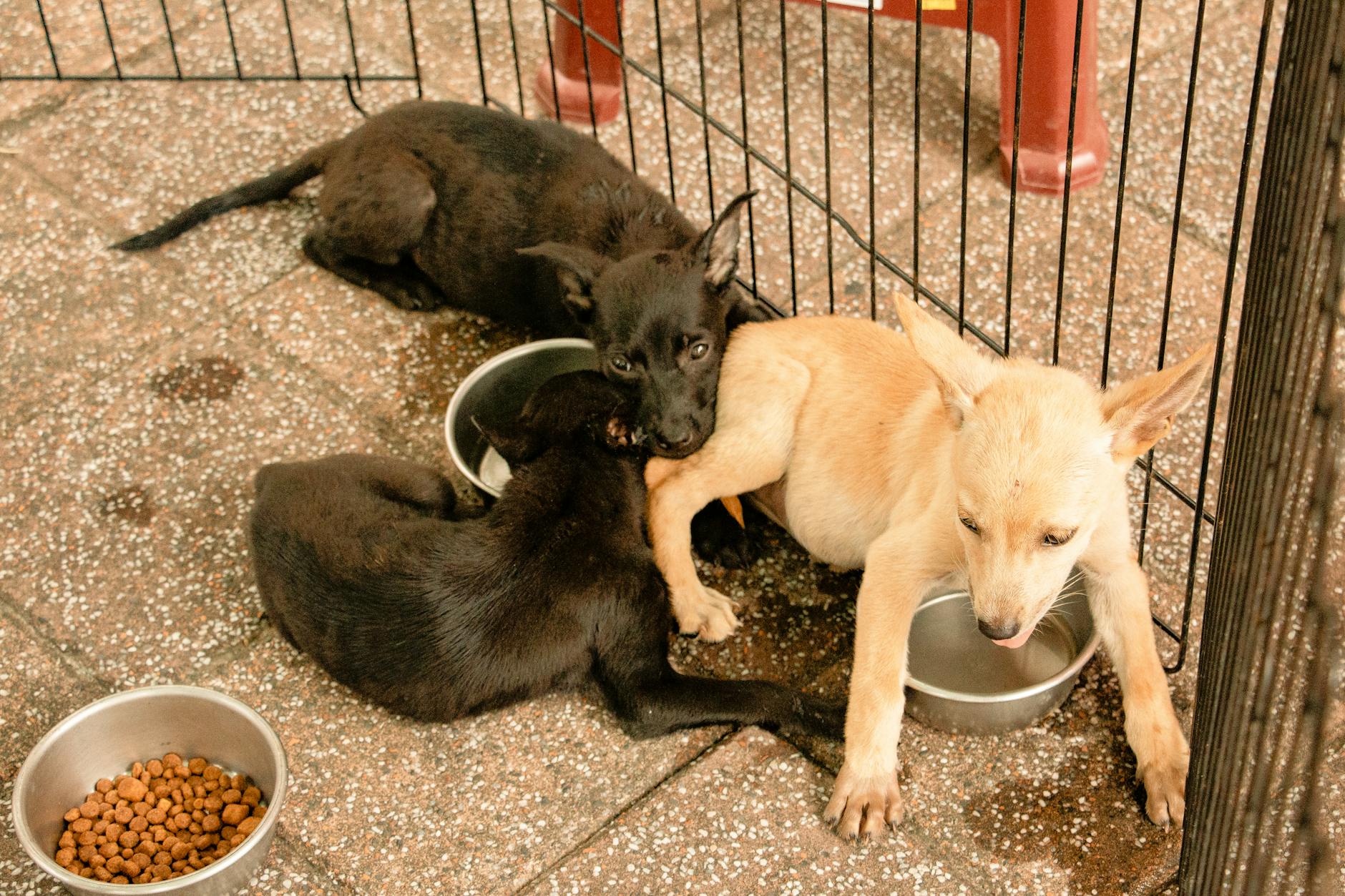Best Dog Food for Sensitive Stomach and Diarrhea [Updated for 2024]

Finding the right food can feel overwhelming when your dog faces sensitive stomach issues or diarrhea. Symptoms like frequent vomiting, diarrhea, or bloating point to digestive trouble that needs attention. The good news?
Choosing a gentle, nutrient-rich diet tailored to their needs can make a difference. You’ll find options carefully designed to ease discomfort and promote healthy digestion. For specific recommendations, check out our best dog food for sensitive stomachs to get started. You can help your furry friend feel better faster with the right approach.
Table of Contents
Understanding Sensitive Stomachs in Dogs
Dogs, just like humans, can deal with unpredictable stomach issues. A sensitive stomach isn’t just inconvenient; it can disrupt your dog’s energy, mood, and overall health. Knowing what to look for and identifying root causes is essential for helping your furry friend feel their best.

Photo by Suhas Hanjar
Common Symptoms of Sensitive Stomachs
When your dog has a sensitive stomach, the signs often appear during or after mealtimes. Being aware of these physical symptoms can help you seek the right solutions:
- Vomiting: Frequent vomiting can hint at digestion troubles or food intolerance.
- Diarrhea: Loose or watery stools are a standard indicator that something isn’t sitting well with your pup.
- Lack of Appetite: If your dog avoids food, it may be because eating causes discomfort.
- Excessive Gas: Dogs with persistent flatulence might be reacting to certain ingredients.
- Bloating: Swollen bellies can point to improper food digestion.
- Stomach Growling: Audible gurgling noises from their stomach could suggest digestion challenges.
If you spot these issues regularly, it might be worth exploring dietary options for sensitive stomachs, such as those discussed in Hill’s Science Diet Puppy Dog Food Guide.
Common Causes of Sensitivity
Several underlying factors can trigger a sensitive stomach in dogs. Understanding these causes can help pinpoint solutions that bring comfort and relief.
- Dietary Allergies: Just like people, dogs can be allergic to foods like beef, chicken, or grains. Allergies often manifest in digestive troubles and itchy skin.
- Food Intolerances: Some dogs struggle with digesting specific ingredients, even if they’re not technically “allergic.” Lactose intolerance is a good example.
- Inappropriate Food: Do you sneak your dog’s table scraps? Human food, especially rich or spicy options, can irritate their system.
- Stress: Stress from a new environment, loud noises, or separation can directly affect your dog’s gut health.
- Medical Conditions: Some dogs have underlying issues like pancreatitis or irritable bowel syndrome that cause sensitivity.
For a deeper dive into alleviating symptoms, check out How to Care for Your Dog’s Sensitive Stomach. Ensuring your dog eats a balanced diet without irritants can make all the difference.
Understanding these symptoms and causes makes it easier to choose a diet and care routine that supports your dog’s health needs. Are you looking for products geared toward digestion? Exploring options like Purina Pro Plan Dog Food for Seniors can relieve tummy troubles in aging dogs.
Choosing the Right Dog Food
Helping your dog with sensitive stomach issues starts with choosing the right food. The right ingredients can soothe their digestive system, while the wrong ones might worsen symptoms. Selecting food tailored to their needs will help them thrive.
Key Ingredients to Look For
When picking dog food for sensitive stomachs, focus on ingredients that promote easy digestion and gut health. Your goal is to minimize irritation and support your dog’s digestive system.

Photo by Anastasia Shuraeva
Here are the top ingredients to consider:
- Probiotics are “good bacteria” that help balance your dog’s gut and reduce inflammation. Foods like yogurt or specially formulated kibbles feature them.
- Digestible Proteins: Look for proteins like chicken, turkey, or fish. These are easier for your dog to process than more decadent options like beef.
- Limited Ingredients: Fewer ingredients often minimize the risk of irritation or allergic reactions. Many limited-ingredient diets focus on simple, clean recipes.
- Fiber Sources: Pumpkin and sweet potato are natural fibers that regulate bowel movements and soothe the stomach.
For more options on sensitive stomach-friendly diets, check out Best Wet Dog Food: Discover Top Picks For Your Furry Friend.
Ingredients to Avoid
Some ingredients can trigger or worsen stomach sensitivity. Reduce issues by avoiding common irritants in your dog’s diet. Think of this as protecting your pup from harmful foods like you’d block cold wind with a coat.
Potential problem ingredients include:
- Artificial Additives: Preservatives, colors, or flavor enhancers often irritate your pup’s stomach. Stick to natural, simple recipes.
- Grains (for some dogs): While not all dogs are intolerant to grains, some may react poorly to wheat or corn.
- Rich Proteins: Beef and lamb can be challenging for sensitive stomachs. Fish or chicken is often easier to digest.
- Dairy Products: Many dogs have lactose intolerance, making cheese or milk a no-go.
Need more guidance? Explore Best Dog Food for Sensitive Stomachs for insightful tips on suitable options.
By understanding what to include and what to avoid, you can make feeding your furry friend a smoother, stress-free experience.
Top Dog Food Recommendations
Finding the best dog food for a sensitive stomach and diarrhea can feel like navigating a maze of options. Knowing which foods are gentle on your pup’s stomach while providing essential nutrients is key to improving their health and wellbeing. Whether you’re an advocate of dry kibble, a fan of wet food, or exploring special diets for unique needs, there are excellent options you can count on.
Best Dry Dog Foods
Dry dog food is convenient, easy to store, and can be just what your pup needs for gentle digestion. When choosing, focus on high-quality options with limited and natural ingredients.
- Hill’s Science Diet Sensitive Stomach & Skin: This formula also benefits skin health and is specifically designed to soothe sensitive digestive systems.
- Purina Pro Plan Sensitive Skin and Stomach: Made with salmon and rice, it’s gentle on the stomach and the skin without sacrificing flavor.
- Royal Canin Veterinary Diet Gastrointestinal Low Fat: Ideal for dogs that need easily digestible nutrients with a focus on gut health.
Dry food options work well for dogs because the crunchy texture promotes dental health and covers nutritional basics. Check out the Top 5 High-Protein Dog Foods for Working Dogs for more dry food specifics.
Best Wet Dog Foods
Wet dog food can offer a moisture-rich alternative to help dogs struggling with hydration or swallowing issues. These are typically softer on sensitive digestive systems.

Photo by Wendy Wei
- Wellness Simple Limited Ingredient Diet Turkey & Potato Canned Food: Created with minimal ingredients, this option supports digestibility while avoiding allergens.
- Blue Buffalo Homestyle Recipe Wet Dog Food: Packed with natural ingredients, it’s an excellent source of essential nutrients.
- Hill’s Science Diet Adult Perfect Digestion Chicken Stew: Specifically formulated to optimize overall gut health with prebiotic fibers.
The added moisture in these wet foods can also help dogs with chronic diarrhea by keeping them hydrated and promoting smoother digestion. Check out 4 Best Wet Dog Foods: A Guide To Optimal Canine Nutrition for more premium options.
Considerations for Special Diets
Is your dog’s sensitive stomach part of a more significant health issue? If so, a specialized diet may be essential. These diets target conditions like allergies, chronic GI issues, or pancreatitis.
- Allergy Relief: Limited ingredient diets like Canidae PURE Grain-Free Recipes cut out common allergens like wheat and soy.
- Pancreatitis or Weight Management: Low-fat options, like Royal Canin Gastrointestinal Low Fat, are easier on the digestive system while still providing essential nutrients.
- Chronic GI Issues: Prescription diets such as Hill’s Prescription Diet i/d Digestive Care are tailored to dogs with ongoing stomach sensitivity.
Always consult your vet before transitioning to a special diet. Consider reading Best Dog Food For Herding Breeds 2024 to explore unique breed-specific options.
External resources like Sensitive Stomach Dog & Puppy Food for Digestion offer more suggestions for addressing individual concerns.
When to Consult a Vet
Digestive issues like sensitive stomachs or diarrhea in dogs can often be managed with dietary changes and home care. However, some situations demand professional attention to ensure your furry friend’s health and safety. Knowing when to consult a veterinarian can help you act quickly and protect your pet from more serious problems.
Signs of Serious Issues
While occasional stomach upset is common in dogs, specific symptoms should never be ignored. If you notice any of the following, it’s time to contact your vet immediately:
- Blood in Vomit or Stool: This could indicate internal bleeding or severe gastrointestinal issues.
- Severe Dehydration: Persistent diarrhea and vomiting can lead to dehydration, which becomes life-threatening if untreated.
- Lethargy or Lack of Energy: If your dog seems unusually tired or disinterested in activities, it could signal an underlying illness.
- Abdominal Pain: Crying out when touched or a tight, bloated belly requires prompt examination.
- Ongoing Vomiting or Diarrhea: Episodes lasting more than 24 hours need a professional diagnosis.
- Sudden Weight Loss: A quick drop in weight might suggest a more serious condition, like parasites or organ issues.
For more advice, explore When Should I Call the Vet?, which details critical symptoms requiring medical attention.
Routine Check-ups and Diet Changes
Even if your dog isn’t showing alarming symptoms, regular vet visits are essential, especially when transitioning to a new diet. Here’s why:
- Health Monitoring: Routine visits help track your dog’s weight, nutrition, and overall health.
- Identifying Sensitivities: Vets can pinpoint potential allergens or irritants before they become a bigger issue.
- Safe Diet Transitions: Gradual changes are key to avoiding upset stomachs. A vet can recommend the best method for introducing new foods.
Imagine your dog’s gut like a delicate ecosystem—it needs time and care to adjust to new conditions. Always consult your vet before making dietary adjustments. Learn more about this from Why Do Dogs Eat Grass?, which touches on digestive health and behaviors.

Photo by Tima Miroshnichenko
Acting early and staying informed with professional advice can save your dog from unnecessary discomfort and significant health risks. For more signs that might warrant a vet visit, check out 11 Signs Your Pet Needs to See a Vet.
Additional Tips for Managing Sensitive Stomachs
Managing a dog with a sensitive stomach involves more than just diet changes. You can minimize discomfort and help your pup feel its best with the right strategies. Below are additional steps you can take to support your digestive health.
Gradual Food Transition
Switching your dog’s food too quickly can upset their stomach further. A slow and steady approach is essential to success.
Introduce the new food gradually over 7–10 days. Mix 25% of the latest food with 75% of the old food for the first few days. Then, increase the ratio to 50/50 halfway through the transition. Finally, feed 75% new and 25% old food until your dog adjusts completely. This gradual shift gives their digestive system time to adapt, preventing potential side effects like diarrhea or gas.
Quick transitions can be like an abrupt change in our diets—your dog’s gut might rebel with bloating or upset stools. Patience ensures smoother digestion. You can explore The Best Dog Food for Sensitive Stomachs for more specifics on sensitive stomach foods.
If your dog shows resistance during the transition, don’t rush. It’s better to extend the timeline rather than risk discomfort.

Photo by Francesco Ungaro
Monitoring Your Dog’s Response
Once you’ve switched their diet, keep a close eye on how your dog reacts. Your observations are key to determining whether the new food is helping improve their stomach sensitivity.
What should you look for?
- Improved Stool Consistency: Firmer, well-formed stools are a positive sign.
- Reduced Vomiting or Gas: A calmer tummy suggests the diet is working.
- Increased Energy: If they seem more playful, the food likely agrees.
- Less Scratching: Digestive sensitivities often pair with skin issues, so check for fewer signs of irritation.
Keeping a food journal can also help. Jot down your dog’s symptoms, energy levels, and stool consistency daily. This log will give you and your vet precise data to assess how food affects their health.
For extra tips on managing sensitive stomachs, check out Tips for Dogs with Sensitive Stomachs. If symptoms like diarrhea or vomiting persist after a diet change, contact your vet immediately to rule out underlying conditions.
You can set your dog up for digestive success by transitioning gradually and closely monitoring their response.
FAQ About Dog Food for Sensitive Stomach and Diarrhea
Questions are bound to arise when addressing your dog’s sensitive stomach or diarrhea. Below, we’ve compiled answers to some of the most frequently asked questions to help guide you on this journey. Understanding your dog’s dietary needs is essential for their health and happiness.
What Can I Feed My Dog to Help With Diarrhea?
A bland diet is often the best starting point if your dog has diarrhea. Foods like boiled chicken and plain, cooked white rice can help settle an upset stomach. Avoid adding seasoning, oil, or butter, as these may irritate their stomach further. For additional guidance, check out How a Bland Diet for Dogs Helps With Stomach Upset, which explains the benefits of this approach.
How Do I Know If My Dog Needs Sensitive Stomach Dog Food?
Your dog might need a sensitive stomach diet if they experience frequent vomiting, diarrhea, gurgling stomach noises, or gas after meals. These signs often indicate that their diet isn’t compatible with their digestive system. Explore Sensitive Stomach Dog Food: What You Should Know for ideas on suitable products.
Should I Avoid Grains in My Dog’s Diet?
Not all dogs are sensitive to grains, but some may develop gastrointestinal issues from grain-based diets. If you suspect grains might be an issue, try switching to a grain-free diet and monitor their symptoms. Ingredients like white potatoes or sweet potatoes are excellent substitutes that aid digestion without upsetting the stomach. More insights on this topic are available at Sensitive Stomach Dog Food: Keeping Your Furry Friend Happy.
Can Stress Cause a Sensitive Stomach in Dogs?
Yes, stress can significantly impact your dog’s gut health. Like humans, dogs experience stress-related symptoms, including diarrhea or a loss of appetite. Minimizing triggers such as loud noises or changes in routine can help. Pair that with a calming, nutrient-dense food designed for sensitive stomachs to lessen the impact. For more in-depth tips on handling canine stress and digestion, read Dog Foods for Sensitive Stomachs.
Is Wet Food or Dry Food Better for Sensitive Stomachs?
Both wet and dry foods have their benefits, but wet food tends to be gentler on sensitive tummies due to its higher moisture content. This makes it easier to digest and reduces the risk of dehydration. However, not all wet foods provide the same nutritional value, so opt for high-quality, limited-ingredient options. For recommendations, check out Best Dog Food for Sensitive Stomachs.

Photo by MART PRODUCTION
How Long Should I Wait Before Consulting a Vet?
If your dog’s symptoms persist for more than 24-48 hours or worsen, it’s time to consult your vet. Severe cases, such as blood in stool, extreme lethargy, or severe dehydration, require immediate medical attention. A vet can perform diagnostics to rule out more serious conditions and recommend prescription diets like Hill’s Prescription Diet i/d Digestive Care if needed.
If you’re exploring breed-specific dietary concerns, check out The Ultimate Guide To Poodles for tailored solutions.
This FAQ section answers some of the most common questions dog owners face, helping you make informed choices for your furry friend’s health.
Conclusion
Finding suitable food for a dog with a sensitive stomach or diarrhea isn’t just about solving the immediate problem—it’s about setting them up for long-term health and comfort. Careful choices in your dog’s diet can improve their digestion, energy levels, and overall mood. Take the time to transition their food gradually, monitor their symptoms, and consult your vet when needed for optimal results.
For further insights and to explore more choices, visit Best Dog Food For Sensitive Stomachs – Dog Nutrition Guidelines or Dog Food For Health Issues.






